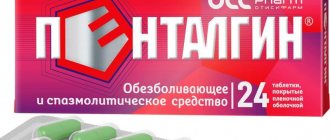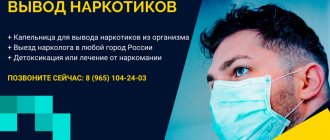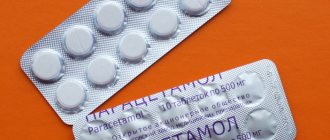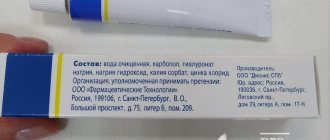Release form and composition
Dosage form - tablets: from white with a cream or yellow tint to white, biconvex in shape, in the form of a capsule with flat side surfaces, on one side there is a risk, on the other there is an engraving “PENTALGIN” (in a cardboard pack of 1 or 2 contour strips 6, 10 or 12 tablets each and instructions for use of Pentalgin-ICN).
Active ingredients in 1 tablet:
- paracetamol – 300 mg;
- caffeine – 50 mg;
- metamizole sodium – 300 mg;
- codeine phosphate – 8 mg;
- phenobarbital – 10 mg.
Auxiliary components in Pentalgin-ICN: potato starch, povidone, stearic acid, calcium stearate.
Pentalgin painkiller tablet. 24 pcs.
Active substance:
1 tablet contains: paracetamol - 325 mg, naproxen - 100 mg, caffeine anhydrous - 50 mg, drotaverine hydrochloride - 40 mg, pheniramine maleate - 10 mg.
Excipients:
Microcrystalline cellulose - 128.0000 mg, potato starch - 55.3800 mg, croscarmellose sodium - 32.0000 mg, hyprolose (hydroxypropylcellulose) - 32.5200 mg, citric acid monohydrate - 3.0000 mg, butylated hydroxytoluene (E 321 ) - 0.3000 mg, magnesium stearate - 7.2000 mg, talc - 16.1200 mg, quinoline yellow dye (E 104) - 0.4608 mg, indigo carmine (E 132) - 0.0192 mg; Shell: hypromellose (hydroxypropyl methylcellulose) - 12.1700 mg, povidone (medium molecular weight polyvinylpyrrolidone, povidone-K25) - 3.8700 mg, polysorbate-80 (Tween-80) - 1.1000 mg, titanium dioxide - 3.4300 mg, talc - 4.2180 mg, quinoline yellow dye (E 104) - 0.2000 mg, indigo carmine (E 132) - 0.0127 mg, or OPADRAY 13A210001 Green shell (OPADRY 13A210001 GREEN) - 25.0007 mg [hypromellose - 12 ,1700 mg, povidone - 3.8700 mg, polysorbate-80 -1.1000 mg, titanium dioxide - 3.4300 mg, talc - 4.2180 mg, quinoline yellow - 0.2000 mg, FD&C blue #2/ indigo carmine - 0.0127 mg].
Description:
Let's do it without pain! Pentalgin® is a patented five-component pain reliever that has a pronounced analgesic effect, relieves spasms and relieves inflammation.
Strengthens the analgesic effect due to the combination of active ingredients; Simultaneously affects various stages of pain syndrome formation; Reduced doses of the main analgesic components compared to single drugs; It has a complex effect: it is simultaneously analgesic, anti-inflammatory, antispasmodic and antipyretic; Relieves pain of various origins; Film-coated tablets are easier to swallow and provide better stability of the active ingredients.
Light green to green, biconvex, capsule-shaped tablets with beveled edges, scored on one side and PENTALGIN embossed on the other. On a cross section, the kernel is light green with white splashes
Release form:
Film-coated tablets. 12 tablets each in a blister pack made of polyvinyl chloride film and printed varnished aluminum foil. 2 blister packs along with instructions for use in a cardboard pack.
Pharmacological properties
Pharmacodynamics
Pentalgin-ICN is one of the combination drugs that have antipyretic, analgesic and anti-migraine effects, which is due to the properties of the active components:
- paracetamol: is an analgesic-antipyretic; blocks COX (cyclooxygenase) mainly in the central nervous system by affecting the centers of thermoregulation and pain; has analgesic and antipyretic properties;
- metamizole sodium: is a pyrazolone derivative, an analgesic-antipyretic; has a pronounced analgesic effect;
- caffeine: is a psychostimulant; reduces the severity of headaches of vascular origin (including migraine) and improves well-being;
- phenobarbital: is a barbiturate; increases the analgesic effect of paracetamol and metamizole sodium;
- codeine: has an analgesic property, which is due to the stimulation of opioid receptors in various parts of the central nervous system, which leads to a change in the emotional perception of pain and stimulation of the antinociceptive system.
Pharmacodynamics and pharmacokinetics
This combination drug is characterized by analgesic, antipyretic and anti-inflammatory effects, which is caused by metamizole and naproxen .
Thanks to caffeine, the general well-being of patients improves and headaches . Phenobarbital can increase the effect of treatment with metamizole sodium and paracetamol . Codeine exhibits an antitussive effect by suppressing excitability in the cough center. The analgesic effect of this drug is caused by significant stimulation of opiate receptors in peripheral tissues and the nervous system, which stimulates the antinoceceptive system and changes in emotional pain perception.
Contraindications
Absolute:
- severe liver/renal failure;
- deficiency of glucose-6-phosphate dehydrogenase;
- alcohol intoxication;
- bronchial asthma;
- conditions that are accompanied by respiratory depression;
- leukopenia, anemia;
- acute myocardial infarction;
- cranial hypertension;
- glaucoma;
- arrhythmias;
- age up to 12 years;
- pregnancy and lactation;
- individual intolerance to the components in Pentalgin-ICN.
Relative (Pentalgin-ICN tablets are prescribed under medical supervision):
- arterial hypertension;
- peptic ulcer of the stomach and duodenum in remission;
- elderly age.
Indications for use
As a rule, Pentalgin ICN is prescribed for:
- moderate and mild pain of various origins, affecting joints, muscles, and lumbar region;
- menstrual pain;
- toothache, headache, neuralgia;
- colds that are accompanied by fever.
Side effects
- cardiovascular system: tachycardia, palpitations;
- central nervous system: drowsiness, dizziness;
- hematopoietic system: granulocytopenia, leukopenia, agranulocytosis;
- digestive system: dyspeptic disorders in the form of vomiting, nausea, constipation;
- allergic reactions: itching, rash, urticaria;
- others (in the case of prolonged uncontrolled use of high doses): addiction (manifests itself as a weakening of the analgesic effect), liver/renal failure, drug dependence (to codeine).
Overdose
Long-term use of tablets in high doses can lead to disruption of the liver and kidneys, tachycardia, and a decrease in the speed of psychomotor reactions. In addition, prolonged uncontrolled use of the drug in high dosages is addictive, and the presence of codeine in its composition causes drug dependence.
Typically, an overdose is manifested by nausea, vomiting, gastralgia, tachycardia, arrhythmia, and depression of the respiratory center.
Therapy includes gastric lavage, intestinal adsorbents and other symptomatic treatment.
special instructions
During therapy, athletes may experience changes in the results of doping control tests.
When carrying out long-term treatment (from 7 days), it is necessary to monitor the functional state of the liver and the picture of peripheral blood.
In acute abdominal pain syndrome, taking Pentalgin-ICN may complicate the diagnosis.
The risk of developing hypersensitivity reactions is higher in patients with hay fever and atopic bronchial asthma.
Impact on the ability to drive vehicles and complex mechanisms
While using Pentalgin-ICN, patients should refrain from driving vehicles and activities that require rapid psychomotor reactions and increased concentration.
Reviews of Pentalgin ICN
For many people, taking painkillers is common practice to relieve pain and postpone a visit to the doctor indefinitely. Therefore, reviews of Pentalgin ICN are quite common, since it is one of the most popular painkillers.
These pills are especially actively used by women who are bothered by menstrual pain. It should be noted that this indicates the presence of a menstrual cycle disorder, which requires contacting a gynecologist to identify the causes of pain.
In addition, this remedy helps eliminate headaches and toothaches. However, some users note how quickly this medicine works and how long it took them to find something suitable.
One way or another, the appearance of pain indicates the presence of a deviation in the functioning of the body. Therefore, if pain appears again after taking it, a person should quickly consult a doctor. As you know, timely treatment helps to quickly eliminate the disorder and will not allow it to develop into a more complex form. Therefore, there is no need to be afraid, but it is better to find time and take care of your health.
Drug interactions
- drugs that have a depressant effect on the central nervous system (including sedatives and tranquilizers): the severity of the inhibitory effect on the respiratory center and the sedative effect may be increased;
- non-opioid analgesics: increased toxic effects;
- ethanol: the effect on the psychomotor reaction is enhanced;
- cyclosporine: its concentration decreases (due to metamizole sodium);
- indirect anticoagulants, oral hypoglycemic drugs, glucocorticosteroids, indomethacin: increase in their activity (due to metamizole sodium);
- phenylbutazone, barbiturates and other inducers of microsomal liver enzymes: the effect of metamizole sodium is weakened;
- allopurinol, tricyclic antidepressants, oral contraceptives: the metabolism of metamizole sodium in the liver is disrupted and its toxicity increases.
Pentanov-ICN
The combined drug has an analgesic, antipyretic, and anti-migraine effect.
Paracetamol is a non-narcotic analgesic; blocks the enzyme cyclooxygenase mainly in the central nervous system, affecting the centers of pain and thermoregulation; has an analgesic and antipyretic effect. Metamizole sodium is a non-steroidal anti-inflammatory drug with a pronounced analgesic effect. Caffeine improves the well-being of patients and reduces headaches of vascular origin (including migraine).
Phenobarbital increases the analgesic effectiveness of metamizole sodium and paracetamol. Codeine has an analgesic effect due to the stimulation of opiate receptors in various parts of the central nervous system, leading to stimulation of the antinociceptive system and a change in the emotional perception of pain.
Ingredients: paracetamol, metamizole sodium, codeine, caffeine, phenobarbital.
Indications for use
Pentanov®-ICN is used for pain of various origins of weak and moderate intensity (including pain in the joints, muscles, radiculitis, menstrual pain, neuralgia, headaches and toothaches). Pentanov®-ICN can be used for colds accompanied by fever.
Contraindications
Hypersensitivity, severe hepatic and/or renal failure, hepatic porphyria, bronchial asthma, complete or incomplete combination of bronchial asthma, recurrent polyposis of the nose and paranasal sinuses, and intolerance to acetylsalicylic acid or other non-steroidal anti-inflammatory drugs: deficiency of glucose-6-phosphate dehydrogenase; anemia, leukopenia, agranulocytosis, hemorrhagic diathesis; conditions accompanied by respiratory depression, increased intracranial pressure, acute myocardial infarction, arrhythmias, alcohol intoxication, history of abuse of opioids, tranquilizers, sedatives; glaucoma, pregnancy, lactation, children under 12 years of age.
The drug is contraindicated in children and adolescents aged 12 to 18 with respiratory pathology (for example, bronchial asthma and other chronic respiratory diseases). after undergoing tonsillectomy and/or adenoidectomy, with impaired respiratory function, including neuromuscular disorders, severe heart disease, multiple traumas or major surgical interventions.
Not recommended for patients with high activity of cytochrome P450 enzymes (CYP2D6).
For complete information, please refer to the instructions for medical use.





